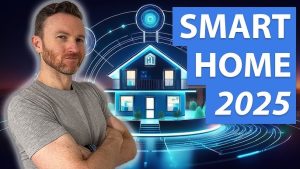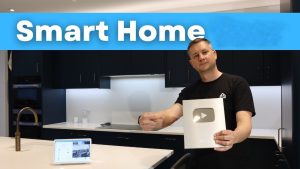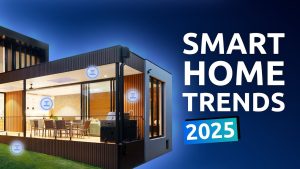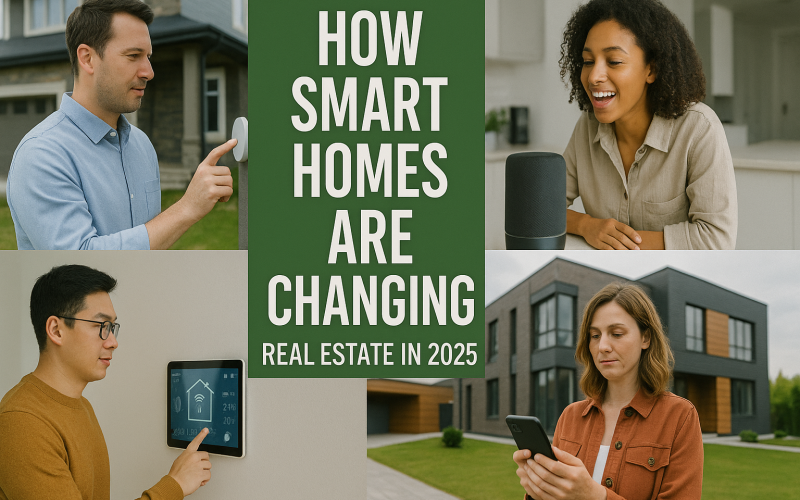Introduction
Imagine a home that adjusts its lights, temperature, and security while you rush out the door. Welcome to 2025, where smart homes real estate is no longer a novelty but a driving force in property markets. From voice-activated locks to energy-saving thermostats, smart home technology is rewriting how buyers choose, value, and invest in real estate. In this article, we explore what smart homes are, why they matter in 2025, and how they shape the future of property buying and selling.
What Is a Smart Home?

A smart home system uses connected devices—like sensors, cameras, and voice assistants—to automate daily tasks. You can lock doors with an app, adjust shades with a tap, or let your fridge remind you to buy milk. In the past, these features felt like luxury. Today, they’re a key part of real estate trends 2025.
Smart home devices rely on the Internet of Things (IoT). Each device talks to a central hub or cloud service. That hub learns your habits and adapts—for instance, dimming lights when you start a movie or lowering heating when everyone leaves. This seamless integration makes life easier and more efficient.
Rise of Smart Homes in 2025

Smart home hubs have moved from niche to normal in just a few years. Builders now include wiring and hubs for internet-connected devices in new houses. Buyers expect features like voice-controlled or voice-commanded lights, smart light bulbs, smart thermostats that learn daily schedules, and security cameras they can check on their phones. Tech companies and homebuilders work together to preinstall apps that tie everything into one dashboard. Even older homes are being retrofitted with smart plugs and sensors. This quick spread shows that home life is becoming more digital by default, changing what people look for when they shop for property.
Why Smart Homes Matter in 2025

In 2025, buyers expect more than square footage and curb appeal. They want homes that work for them. Studies show that properties with built-in automation systems sell faster and at higher prices. That means agents and developers who embrace property value increase through automation see a clear advantage.
Additionally, energy costs and environmental concerns drive demand for energy-efficient homes. Smart thermostats, solar monitoring, and leak detectors reduce waste and save money. As utility bills rise, many buyers factor these savings into their budgets.
Benefits for Homebuyers and Sellers
For buyers, smart homes offer convenience, safety, and savings. A new homeowner might monitor energy use on their phone, lock doors remotely, or check cameras while on vacation. This peace of mind is priceless. The ability to personalize routines—such as setting morning lights to warm white adds daily comfort.
Sellers and agents also gain. A home with home automation systems stands out in listings. Virtual tours can highlight these features, drawing more interest. And because smart homes often carry higher appraised values, sellers can ask for a premium, justifying upgrades like a smart thermostat or automated blinds.
Role of Smart Homes in Modern Real Estate

In today’s market, smart-home tech is a core part of how properties are presented and sold. Listings list details like voice-activated assistants, automated climate control, and app-driven security from the start. During virtual tours, agents demo turning lights on with a command, adjusting blinds, or checking who’s at the door. Open houses feature live displays of energy-usage stats and remote-access features. Developers design entire communities with shared smart grids and neighborhood alert systems. As a result, home automation has moved from an optional add-on to a must-have amenity that shapes buyer decisions and marketing strategies.
Key Smart Home Technologies Shaping Real Estate

Several technologies are transforming homes and property markets:
- Intelligent Climate Control: Smart thermostats learn preferences and cut energy waste.
- Connected Security Systems: Video doorbells, smart locks, and motion sensors protect homes 24/7.
- Voice-Activated Assistants: Devices like smart speakers control lighting, music, and routines.
- Automated Lighting: LED bulbs adjust brightness and color based on time of day or activity.
- Smart Appliances: Refrigerators with inventory tracking, ovens you preheat from your phone.
Tips for Real Estate Professionals

To thrive with real estate trends 2025, agents and developers can:
- Showcase Automation in Staging: When staging homes, demonstrate smart features live. Let visitors control lights or thermostat to feel the magic firsthand.
- Offer Smart Home Guides: Provide simple guides that explain each device, how to use it, and basic troubleshooting steps.
- Partner with Tech Installers: Build relationships with reputable home-automation installers. Offer buyers upgrade packages as part of closing deals.
- Highlight Cost Savings: Emphasize how energy-efficient homes reduce bills and often qualify for green certifications or tax rebates.
- Invest in Demonstration Homes: Create model homes with a full suite of smart features. Virtual or in-person tours of these spaces can drive serious buyer interest.
Long-Term Value and Market Trends

As 2025 advances, smart home features are shaping property values and buyer expectations. Homes with well-maintained systems sell faster and often at higher prices than those without. Buyers see built-in automation and security as essentials, not luxuries. Real estate marketing now includes tech reports on energy savings and device performance. Investors look for properties with upgradable wiring and firmware-friendly hubs. Even smaller or older markets are adapting by offering retrofit packages. In turn, resale values rise for homes that stay current with tech trends. Over time, smart features will be as standard as central heating and running water in every real estate listing.
Challenges and Considerations
Despite the upsides, smart homes bring challenges. First, compatibility issues can frustrate users. Not every device works with every hub or voice assistant. Buyers may find themselves juggling multiple apps.
Second, cybersecurity matters more than ever. Each connected device is a potential entry point for hackers. Sellers need to ensure networks are secured, passwords updated, and firmware patched. Agents should advise buyers to change default settings and use strong, unique passwords.
Third, maintenance and updates can be confusing. A smart lock update might break routines if ignored. Clear documentation and simple interfaces help new owners manage their devices without stress.
Future Outlook for Smart Homes and Real Estate

As we look beyond 2025, smart home integration will become standard. New homes may include built-in wiring and hubs during construction. Legacy homes will see retrofit kits for seamless upgrades.
Artificial intelligence will play a larger role. Predictive analytics could adjust settings based on weather forecasts or even your calendar. Energy grids might communicate with homes to shift usage during peak times, saving utilities and homeowners money.
Real estate platforms will evolve too. Listings may include live device demos or interactive floor plans that let buyers toggle lights and cameras virtually. In this way, real estate trends 2025 will continue shifting toward fully connected, user-centric experiences.
Comparative Table: Technology Benefits and Impact on Real Estate 2025
| Technology | Benefit | Impact on Real Estate |
|---|---|---|
| Intelligent Climate Control | Lowers energy bills by up to 15% | Higher appraisal for efficiency |
| Connected Security Systems | Reduces break-ins and vandalism | Increased buyer confidence and speed of sale |
| Voice-Activated Assistants | Hands-free home management | Greater appeal to tech-savvy buyers |
| Automated Lighting | Enhances mood and security | Adds modern touch to staging |
| Smart Appliances | Improves convenience | Seen as luxury feature, boosts value |
This table shows how each innovation contributes to home connectivity and a stronger sales position.
Conclusion
Smart homes are redefining real estate in 2025 by blending comfort, safety, and savings. With smart home technology driving faster sales and higher values, both buyers and sellers stand to benefit. While challenges like compatibility and security exist, clear guidance and professional partnerships can smooth the transition. As AI and connectivity evolve, expect automation to become a must-have feature rather than a luxury.
Call to Action
Ready to elevate your property portfolio? Contact our team today to explore smart home upgrades that boost value and delight buyers!












